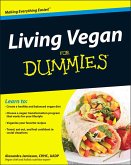Glycemic Index Diet For Dummies (eBook, PDF)


Alle Infos zum eBook verschenken

Glycemic Index Diet For Dummies (eBook, PDF)
- Format: PDF
- Merkliste
- Auf die Merkliste
- Bewerten Bewerten
- Teilen
- Produkt teilen
- Produkterinnerung
- Produkterinnerung

Hier können Sie sich einloggen

Bitte loggen Sie sich zunächst in Ihr Kundenkonto ein oder registrieren Sie sich bei bücher.de, um das eBook-Abo tolino select nutzen zu können.
Get proven results from this safe, effective, and easy-to-follow diet The glycemic load is a ranking system for carbohydrate-rich food that measures the amount of carbohydrates in a serving. The glycemic index indicates how rapidly a carbohydrate is digested and released as glucose (sugar) into the bloodstream. Using the Glycemic Index is a proven method for calculating the way carbohydrates act in your body to help you lose weight, safely, quickly, and effectively. The second edition of The Glycemic Index Diet For Dummies presents this system in an easy-to-apply manner, giving you the tools…mehr
- Geräte: PC
- mit Kopierschutz
- eBook Hilfe
- Größe: 13.93MB
![Fast Diets For Dummies (eBook, PDF) Fast Diets For Dummies (eBook, PDF)]() Kellyann PetrucciFast Diets For Dummies (eBook, PDF)13,99 €
Kellyann PetrucciFast Diets For Dummies (eBook, PDF)13,99 €![Belly Fat Diet For Dummies (eBook, PDF) Belly Fat Diet For Dummies (eBook, PDF)]() Erin Palinski-WadeBelly Fat Diet For Dummies (eBook, PDF)16,99 €
Erin Palinski-WadeBelly Fat Diet For Dummies (eBook, PDF)16,99 €![Living Paleo For Dummies (eBook, PDF) Living Paleo For Dummies (eBook, PDF)]() Melissa JoulwanLiving Paleo For Dummies (eBook, PDF)13,99 €
Melissa JoulwanLiving Paleo For Dummies (eBook, PDF)13,99 €![Living Vegan For Dummies (eBook, PDF) Living Vegan For Dummies (eBook, PDF)]() Alexandra JamiesonLiving Vegan For Dummies (eBook, PDF)16,99 €
Alexandra JamiesonLiving Vegan For Dummies (eBook, PDF)16,99 €![Cooking with Chia For Dummies (eBook, PDF) Cooking with Chia For Dummies (eBook, PDF)]() Barrie RogersCooking with Chia For Dummies (eBook, PDF)13,99 €
Barrie RogersCooking with Chia For Dummies (eBook, PDF)13,99 €![Beating Sugar Addiction For Dummies (eBook, PDF) Beating Sugar Addiction For Dummies (eBook, PDF)]() Dan DefigioBeating Sugar Addiction For Dummies (eBook, PDF)16,99 €
Dan DefigioBeating Sugar Addiction For Dummies (eBook, PDF)16,99 €![Acid Alkaline Diet For Dummies (eBook, PDF) Acid Alkaline Diet For Dummies (eBook, PDF)]() Julie WilkinsonAcid Alkaline Diet For Dummies (eBook, PDF)13,99 €
Julie WilkinsonAcid Alkaline Diet For Dummies (eBook, PDF)13,99 €-
-
-
Dieser Download kann aus rechtlichen Gründen nur mit Rechnungsadresse in A, B, BG, CY, CZ, D, DK, EW, E, FIN, F, GR, HR, H, IRL, I, LT, L, LR, M, NL, PL, P, R, S, SLO, SK ausgeliefert werden.
- Produktdetails
- Verlag: John Wiley & Sons
- Seitenzahl: 416
- Erscheinungstermin: 21. Januar 2014
- Englisch
- ISBN-13: 9781118808061
- Artikelnr.: 40391022
- Verlag: John Wiley & Sons
- Seitenzahl: 416
- Erscheinungstermin: 21. Januar 2014
- Englisch
- ISBN-13: 9781118808061
- Artikelnr.: 40391022
- Herstellerkennzeichnung Die Herstellerinformationen sind derzeit nicht verfügbar.
About This Book 1
Conventions Used in This Book 2
Foolish Assumptions 2
What You're Not to Read 3
How This Book Is Organized 3
Part I: Exploring the Glycemic Index as a Weight-Loss Tool 3
Part II: Switching to a Low-Glycemic Diet 3
Part III: Overcoming Challenges and Obstacles 4
Part IV: Cooking and Eating the Low-Glycemic Way 4
Part V: Improving Your Overall Lifestyle 4
Part VI: The Part of Tens 5
Part VII: Appendixes 5
Icons Used in This Book 5
Where to Go from Here 6
Part I: Exploring the Glycemic Index as a Weight-Loss Tool 7
Chapter 1: Introducing the Glycemic Index and How to Use It to Lose Weight
9
Getting to Know the Glycemic Index 9
Measuring the glycemic index 10
Introducing the glycemic load 11
How Does the Glycemic Index Work for Weight Loss? 13
Getting the 411 on blood sugar 13
Understanding the role of carbohydrates 14
Seeing how insulin plays a part 16
Putting it all together 16
Moving beyond Traditional Diet Plans 17
Embracing lifestyle change and abandoning the temporary diet 17
Tossing strict rules out the window 18
Planning, cooking, and enjoying healthy meals 19
Making exercise a part of your life 19
Looking at Other Benefits of a Low-Glycemic Diet 20
Better blood sugar and insulin control 20
Disease prevention 21
Increased energy 22
Improved mood 23
Chapter 2: All Carbs Aren't Created Equal 25
Distinguishing Friendly Carbs from Foes 25
Measuring a Food's Glycemic Index 26
Comparing foods to pure sugar with human help 27
Keeping a couple limitations in mind 29
Defining Low-, Medium-, and High-Glycemic Foods 30
Seeing How Fiber Fits into the Mix 31
Fiber and blood sugar control 32
Low-glycemic/high-fiber, a winning combination 33
Chapter 3: Why and How a Low-Glycemic Diet Works for Weight Loss 37
Regulating Insulin and Blood Glucose 37
Keeping blood glucose levels down 39
Controlling food cravings 40
Keeping food addictions at bay 41
Suppressing Your Appetite Naturally 43
Feeling fuller with fiber 43
Bumping up your fullness hormones with low-glycemic foods 43
Combining Low-Glycemic Foods with Calorie Awareness 44
Understanding why calories still count 44
Knowing that low-glycemic doesn't always mean low-calorie 46
Keeping portion sizes under control 46
Eating More of the Right Foods to Lose More Weight 47
Choosing lots of fruits and vegetables 47
Including healthy fats and protein 48
Chapter 4: Taking Portion Size into Account with the Glycemic Load 51
Going from the Glycemic Index to the Glycemic Load 51
Calculating Glycemic Load 53
Doing the math 53
Figuring out what the numbers mean 54
Factoring in portion sizes 54
Embracing High-GI/Low-GL Foods 56
Checking Out How Glycemic Load Varies among Popular Foods 58
Chapter 5: Determining How Going Low-Glycemic Can Work for You 61
Considering Your Weight-Loss Goals 61
Defining healthy weight loss 62
Taking a Close Look at Your Dieting History 63
Evaluating types of diets you've tried 64
Rethinking restrictive dieting 66
Putting a stop to yo-yo dieting 67
Asking yourself the right questions 67
Reviewing the pros and cons of different approaches to weight loss 68
Do You Have Insulin Resistance? 69
Health conditions related to insulin resistance 70
Characteristics of insulin resistance 71
How a low-glycemic lifestyle can help 72
Considering a Low-Glycemic Diet if You Have Kids or Are Pregnant 72
Helping kids have a healthy relationship with food 73
Managing weight and blood sugar while pregnant 74
Part II: Switching to a Low-Glycemic Diet 77
Chapter 6: Preparing Yourself for a Successful Weight-Loss Program 79
Getting and Staying in the Right Mindset 79
Creating your vision 80
Turning your vision into an affirmation 82
Using positive language 82
Setting Goals You Can Actually Achieve 83
Being realistic 83
Making your goals practical 84
Choosing "want to" rather than "have to" goals 84
Strengthening your goals 84
Focusing Your Choices with a Food Journal 85
What to Expect When Starting Your Journey 86
A shift in priorities 87
An adventure with new foods 88
New habits 88
Feeling out of your comfort zone at first 89
Chapter 7: Raising the Bar on Your Metabolism 91
Understanding Basal Metabolic Rate 91
Measuring your metabolic rate 92
Using your metabolic rate as a weight-loss tool 93
Looking at metabolism influences that are largely out of your control 94
Simple Strategies for Increasing Your Metabolic Rate 95
Building lean muscle mass 95
Getting your heart rate up 97
Sprinkling in small activities 98
Eating low-glycemic resistant starches 99
Avoiding Behaviors That Lower Your Metabolic Rate 100
Skipping meals 100
Eating too few calories 101
Chapter 8: Presenting Foolproof Healthy-Eating Strategies 103
Tips for Choosing Low-Glycemic Foods 104
Get acquainted with the glycemic index list 104
Pay attention to portion sizes 104
Keep the glycemic load of your meal at or under 25 106
Changing the Balance of Your Meals 107
Understanding different nutrients' roles and the benefits of balance 108
Using the "tapas" method for meal planning 109
Putting it all together with sample menus 112
Finding Moderation with Medium- and High-Glycemic Foods 114
Defining moderation 115
Balancing your glycemic load for the day 115
Chapter 9: Navigating the Grocery Store 117
Being a Savvy Low-Glycemic Shopper 117
Planning meals to create your grocery list 118
Knowing the best aisles to visit 120
Comparing fresh, frozen, and canned produce 122
Checking ripeness 123
Reading Nutrition Facts Labels 124
Examining the nutrition facts label 124
Using the ingredients list 126
Stocking Up for Success 127
Pantry basics 128
Freezer-friendly favorites 129
Weekly refrigerator staples 129
Part III: Overcoming Challenges and Obstacles 133
Chapter 10; Guidelines for Dining Out 135
Choosing Wisely 136
Basing your choices on how often you eat out 136
Requesting low-glycemic substitutions 137
Watching your portion sizes 138
Picking Low-Glycemic-Friendly Restaurants 142
Presenting the Best Low-Glycemic Food Choices for... 143
American restaurants 143
Chinese restaurants 144
Fast-food restaurants 144
Italian restaurants 145
Japanese restaurants 146
Mexican restaurants 148
Middle Eastern/Greek restaurants 149
Thai restaurants 150
Chapter 11: Navigating Special Occasions 151
Overcoming the Challenges Posed by Vacations, Holidays, and Parties 151
Avoiding the all-or-nothing mentality 152
Discovering moderation with high- glycemic, special-occasion foods 154
Creating balance for the day 155
Finding the Meal Items That Work for You 157
Being prepared for almost anything 157
Volunteering to bring a low-glycemic side dish 158
Presenting the Best Low-Glycemic Food Picks for Special Occasions 159
Holidays 159
Vacations 161
Parties 161
Chapter 12: Dealing with Weight-Loss Pit falls 163
Coping with Food Cravings 163
Low-glycemic foods to the rescue 165
Timing is everything 166
Strategies for Defeating Emotional Eating 166
Discover your triggers 167
Find new healthy behaviors 168
Become a mindful eater 170
Breaking Through Weight-Loss Plateaus 171
Evaluating your weight-loss goals 172
Tracking consistency 174
Switching up your exercise routine 176
Chapter 13: Finding a Support System 179
Knowing When to Seek Help from a Professional 179
When you have a challenging health condition 180
When you're having trouble making changes 181
When you need accountability and support 181
Enlisting the Right Friends and Family Members 182
Knowing which friends to involve 182
Avoiding saboteurs 182
Creating your own support group 184
Surfing the Web for Information, Motivation, and Support 184
Exploring educational websites 184
Getting involved with group forums and message boards 185
Approaching the web with caution 186
Attending Glycemic Index Programs 187
Group classes 187
Professional conferences 188
Part IV: Cooking and Eating the Low-Glycemic Way 189
Chapter 14: Getting Back into the Kitchen 191
Checking Out How Whole Foods and Convenience Foods Stack Up 191
Taking a closer look at convenience foods 192
Creating more control in your daily glycemic load 193
Finding the best convenience foods when needed 194
Making Whole-Foods Cooking Easy 195
Getting back to the basics 196
Prepping made easy 197
Using flavor combinations to add more pizzazz to your meals 198
Showing some easy throw together meals 200
Chapter 15: Low-Glycemic Cooking Tips and Techniques 203
Evaluating and Modifying Your Favorite Recipes 204
Recipe modification tips 204
Recipe makeover examples 205
Cooking Grains and Pastas 208
Presenting your whole grain cooking guide 208
Exploring low-glycemic pastas 209
Livening up your grains and pastas 211
Experimenting with Vegetables 211
Preparing low-glycemic vegetables 212
Boiling versus other cooking methods 212
Introducing Beans, the Truly Magical Fruit 212
Pointing out what you should know about canned beans versus dried 213
Preparing and cooking both kinds of beans 214
Chapter 16: Breakfast Recipes to Star t Your Day Off Right 217
Understanding Why Breakfast Is So Important 218
Reviewing the health benefits of breakfast 218
Feeling fuller for longer with the right balance at breakfast 219
Going on the Run with Grab-and-Go Starters 220
Chowing Down on Cereals 220
Getting a Quick Start with Smoothies 223
Preparing Ahead for a Week's Worth of Fast Breakfast Choices 227
Cooking Eggs for Breakfast When You Have More Time 231
Chapter 17: Luscious Yet Easy Lunches 237
Preparing Healthy Lunches for the Week Ahead 238
Sensational chicken and tuna salads 239
Tasty timesaving casseroles 243
Making Lower-Glycemic Lunches on a Weekday-to-Weekday Basis 248
Powerhouse salad entrees 248
Speedy south-of-the-border options 252
Chapter 18: Delicious Dinner Recipes 257
Purely Delectable Poultry Recipes 257
Beef, the Low-Glycemic Way 263
Fabulous Seafood Recipes 267
Vegetarian Variations 273
Chapter 19: Healthy (And Yummy) Snacks and Desser t s 277
Introducing Snacking Saboteurs 278
The negative effect of mindless grazing 278
The problem with waiting too long to eat 279
Planning Out Healthy Snacks: A Top Weight-Loss Strategy 280
Making Low-Glycemic Snacks at Home: Recipes for Success 282
Choosing and Preparing Lower-Glycemic Treats and Desserts 286
Part V: Improving Your Overall Lifestyle 291
Chapter 20: From Goals to Habits: Making True Lifest yle Changes 293
Making Lifestyle Changes Rather Than Going on a Diet 293
Knowing the difference between lifestyle changes and dieting 294
Focusing on what you can eat, not what you can't 295
Understanding the downfalls of being on and off a diet plan 296
Strategies for Stepping into Change 297
Committing to a new approach 297
Looking for the positives 298
Dealing with setbacks 299
Making Change a Family Affair 302
Talking with your spouse 302
Developing healthy habits for your kids 303
Transitioning your family to a low-glycemic lifestyle 304
Chapter 21: Incorporating Exercise into Your Life 307
Exploring the Many Benefits of Exercise 308
Your natural body shape - revealed 308
Increased energy 308
An improved mood 310
A lower risk of developing chronic diseases 310
Better bone health 311
Reduced stress 312
Creating an Exercise Plan You Can Stick With 312
Dealing with exercise resistance 313
Finding what you enjoy 314
Starting with small steps 315
Making exercise a priority 316
Including cardio and strength training 318
Fueling Your Exercise Routine with a Low-Glycemic Diet 319
Chapter 22: Not Just for Weight Loss: Battling Disease 323
Managing Existing Health Problems 323
Colon cancer 324
Diabetes 325
Polycystic ovary syndrome 326
Hypothyroidism 327
Heart disease 328
Metabolic syndrome 329
Hypoglycemia 330
Wellness and Disease Prevention 331
Lowering your risk of chronic diseases 332
Fighting free radicals with antioxidants 333
Factoring in phytonutrients 335
Part VI: The Part of Tens 339
Chapter 23; Ten My ths about the Glycemic Index. 341
Carrots Are Pure Sugar 341
Watermelon Is Bad for You 342
You Can Never Eat a Potato 342
You Should Never Eat High-Glycemic Foods 342
High-Glycemic Foods Will Make You Gain Weight 343
You Can Eat as Many Low-Glycemic Foods as You Want and Lose Weight 343
High-Glycemic Foods Cause Type 2 Diabetes 344
Low-Glycemic Foods Are Always Nutritious 344
All High-Glycemic Foods Have Little or No Nutritional Value 344
Low-Glycemic Foods All Have Low Calories 345
Chapter 24; Ten Real-Life Strategies to Lighten Your Daily Glycemic Load
347
Eat Rice Wisely 347
Switch Added Sugar on Cereals with Low-Glycemic Fruit 348
Add Veggies to Everything 348
Find the Best Breads 349
Swap Out Starchy Foods for More Beans and Lentils 349
Ditch the High-Glycemic Breakfast 350
Decrease the Sugar in Your Baking 350
Go for the Mini Sizes 350
Cook Your Pasta al Dente 351
Add a Little Vinegar 351
Part VII: Appendixes 353
Appendix A: The Glycemic Load and Common Foods: An At-a-Glance Guide 355
Bakery Treats 355
Beverages 356
Breads and Snacks 357
Breakfast Items 358
Dairy Products 359
Fruits 360
Grains 361
Legumes 362
Meat Products 363
Sweeteners and Candy 364
Vegetables 364
Appendix B: Metric Conversion Guide 367
Index 371
About This Book 1
Conventions Used in This Book 2
Foolish Assumptions 2
What You're Not to Read 3
How This Book Is Organized 3
Part I: Exploring the Glycemic Index as a Weight-Loss Tool 3
Part II: Switching to a Low-Glycemic Diet 3
Part III: Overcoming Challenges and Obstacles 4
Part IV: Cooking and Eating the Low-Glycemic Way 4
Part V: Improving Your Overall Lifestyle 4
Part VI: The Part of Tens 5
Part VII: Appendixes 5
Icons Used in This Book 5
Where to Go from Here 6
Part I: Exploring the Glycemic Index as a Weight-Loss Tool 7
Chapter 1: Introducing the Glycemic Index and How to Use It to Lose Weight
9
Getting to Know the Glycemic Index 9
Measuring the glycemic index 10
Introducing the glycemic load 11
How Does the Glycemic Index Work for Weight Loss? 13
Getting the 411 on blood sugar 13
Understanding the role of carbohydrates 14
Seeing how insulin plays a part 16
Putting it all together 16
Moving beyond Traditional Diet Plans 17
Embracing lifestyle change and abandoning the temporary diet 17
Tossing strict rules out the window 18
Planning, cooking, and enjoying healthy meals 19
Making exercise a part of your life 19
Looking at Other Benefits of a Low-Glycemic Diet 20
Better blood sugar and insulin control 20
Disease prevention 21
Increased energy 22
Improved mood 23
Chapter 2: All Carbs Aren't Created Equal 25
Distinguishing Friendly Carbs from Foes 25
Measuring a Food's Glycemic Index 26
Comparing foods to pure sugar with human help 27
Keeping a couple limitations in mind 29
Defining Low-, Medium-, and High-Glycemic Foods 30
Seeing How Fiber Fits into the Mix 31
Fiber and blood sugar control 32
Low-glycemic/high-fiber, a winning combination 33
Chapter 3: Why and How a Low-Glycemic Diet Works for Weight Loss 37
Regulating Insulin and Blood Glucose 37
Keeping blood glucose levels down 39
Controlling food cravings 40
Keeping food addictions at bay 41
Suppressing Your Appetite Naturally 43
Feeling fuller with fiber 43
Bumping up your fullness hormones with low-glycemic foods 43
Combining Low-Glycemic Foods with Calorie Awareness 44
Understanding why calories still count 44
Knowing that low-glycemic doesn't always mean low-calorie 46
Keeping portion sizes under control 46
Eating More of the Right Foods to Lose More Weight 47
Choosing lots of fruits and vegetables 47
Including healthy fats and protein 48
Chapter 4: Taking Portion Size into Account with the Glycemic Load 51
Going from the Glycemic Index to the Glycemic Load 51
Calculating Glycemic Load 53
Doing the math 53
Figuring out what the numbers mean 54
Factoring in portion sizes 54
Embracing High-GI/Low-GL Foods 56
Checking Out How Glycemic Load Varies among Popular Foods 58
Chapter 5: Determining How Going Low-Glycemic Can Work for You 61
Considering Your Weight-Loss Goals 61
Defining healthy weight loss 62
Taking a Close Look at Your Dieting History 63
Evaluating types of diets you've tried 64
Rethinking restrictive dieting 66
Putting a stop to yo-yo dieting 67
Asking yourself the right questions 67
Reviewing the pros and cons of different approaches to weight loss 68
Do You Have Insulin Resistance? 69
Health conditions related to insulin resistance 70
Characteristics of insulin resistance 71
How a low-glycemic lifestyle can help 72
Considering a Low-Glycemic Diet if You Have Kids or Are Pregnant 72
Helping kids have a healthy relationship with food 73
Managing weight and blood sugar while pregnant 74
Part II: Switching to a Low-Glycemic Diet 77
Chapter 6: Preparing Yourself for a Successful Weight-Loss Program 79
Getting and Staying in the Right Mindset 79
Creating your vision 80
Turning your vision into an affirmation 82
Using positive language 82
Setting Goals You Can Actually Achieve 83
Being realistic 83
Making your goals practical 84
Choosing "want to" rather than "have to" goals 84
Strengthening your goals 84
Focusing Your Choices with a Food Journal 85
What to Expect When Starting Your Journey 86
A shift in priorities 87
An adventure with new foods 88
New habits 88
Feeling out of your comfort zone at first 89
Chapter 7: Raising the Bar on Your Metabolism 91
Understanding Basal Metabolic Rate 91
Measuring your metabolic rate 92
Using your metabolic rate as a weight-loss tool 93
Looking at metabolism influences that are largely out of your control 94
Simple Strategies for Increasing Your Metabolic Rate 95
Building lean muscle mass 95
Getting your heart rate up 97
Sprinkling in small activities 98
Eating low-glycemic resistant starches 99
Avoiding Behaviors That Lower Your Metabolic Rate 100
Skipping meals 100
Eating too few calories 101
Chapter 8: Presenting Foolproof Healthy-Eating Strategies 103
Tips for Choosing Low-Glycemic Foods 104
Get acquainted with the glycemic index list 104
Pay attention to portion sizes 104
Keep the glycemic load of your meal at or under 25 106
Changing the Balance of Your Meals 107
Understanding different nutrients' roles and the benefits of balance 108
Using the "tapas" method for meal planning 109
Putting it all together with sample menus 112
Finding Moderation with Medium- and High-Glycemic Foods 114
Defining moderation 115
Balancing your glycemic load for the day 115
Chapter 9: Navigating the Grocery Store 117
Being a Savvy Low-Glycemic Shopper 117
Planning meals to create your grocery list 118
Knowing the best aisles to visit 120
Comparing fresh, frozen, and canned produce 122
Checking ripeness 123
Reading Nutrition Facts Labels 124
Examining the nutrition facts label 124
Using the ingredients list 126
Stocking Up for Success 127
Pantry basics 128
Freezer-friendly favorites 129
Weekly refrigerator staples 129
Part III: Overcoming Challenges and Obstacles 133
Chapter 10; Guidelines for Dining Out 135
Choosing Wisely 136
Basing your choices on how often you eat out 136
Requesting low-glycemic substitutions 137
Watching your portion sizes 138
Picking Low-Glycemic-Friendly Restaurants 142
Presenting the Best Low-Glycemic Food Choices for... 143
American restaurants 143
Chinese restaurants 144
Fast-food restaurants 144
Italian restaurants 145
Japanese restaurants 146
Mexican restaurants 148
Middle Eastern/Greek restaurants 149
Thai restaurants 150
Chapter 11: Navigating Special Occasions 151
Overcoming the Challenges Posed by Vacations, Holidays, and Parties 151
Avoiding the all-or-nothing mentality 152
Discovering moderation with high- glycemic, special-occasion foods 154
Creating balance for the day 155
Finding the Meal Items That Work for You 157
Being prepared for almost anything 157
Volunteering to bring a low-glycemic side dish 158
Presenting the Best Low-Glycemic Food Picks for Special Occasions 159
Holidays 159
Vacations 161
Parties 161
Chapter 12: Dealing with Weight-Loss Pit falls 163
Coping with Food Cravings 163
Low-glycemic foods to the rescue 165
Timing is everything 166
Strategies for Defeating Emotional Eating 166
Discover your triggers 167
Find new healthy behaviors 168
Become a mindful eater 170
Breaking Through Weight-Loss Plateaus 171
Evaluating your weight-loss goals 172
Tracking consistency 174
Switching up your exercise routine 176
Chapter 13: Finding a Support System 179
Knowing When to Seek Help from a Professional 179
When you have a challenging health condition 180
When you're having trouble making changes 181
When you need accountability and support 181
Enlisting the Right Friends and Family Members 182
Knowing which friends to involve 182
Avoiding saboteurs 182
Creating your own support group 184
Surfing the Web for Information, Motivation, and Support 184
Exploring educational websites 184
Getting involved with group forums and message boards 185
Approaching the web with caution 186
Attending Glycemic Index Programs 187
Group classes 187
Professional conferences 188
Part IV: Cooking and Eating the Low-Glycemic Way 189
Chapter 14: Getting Back into the Kitchen 191
Checking Out How Whole Foods and Convenience Foods Stack Up 191
Taking a closer look at convenience foods 192
Creating more control in your daily glycemic load 193
Finding the best convenience foods when needed 194
Making Whole-Foods Cooking Easy 195
Getting back to the basics 196
Prepping made easy 197
Using flavor combinations to add more pizzazz to your meals 198
Showing some easy throw together meals 200
Chapter 15: Low-Glycemic Cooking Tips and Techniques 203
Evaluating and Modifying Your Favorite Recipes 204
Recipe modification tips 204
Recipe makeover examples 205
Cooking Grains and Pastas 208
Presenting your whole grain cooking guide 208
Exploring low-glycemic pastas 209
Livening up your grains and pastas 211
Experimenting with Vegetables 211
Preparing low-glycemic vegetables 212
Boiling versus other cooking methods 212
Introducing Beans, the Truly Magical Fruit 212
Pointing out what you should know about canned beans versus dried 213
Preparing and cooking both kinds of beans 214
Chapter 16: Breakfast Recipes to Star t Your Day Off Right 217
Understanding Why Breakfast Is So Important 218
Reviewing the health benefits of breakfast 218
Feeling fuller for longer with the right balance at breakfast 219
Going on the Run with Grab-and-Go Starters 220
Chowing Down on Cereals 220
Getting a Quick Start with Smoothies 223
Preparing Ahead for a Week's Worth of Fast Breakfast Choices 227
Cooking Eggs for Breakfast When You Have More Time 231
Chapter 17: Luscious Yet Easy Lunches 237
Preparing Healthy Lunches for the Week Ahead 238
Sensational chicken and tuna salads 239
Tasty timesaving casseroles 243
Making Lower-Glycemic Lunches on a Weekday-to-Weekday Basis 248
Powerhouse salad entrees 248
Speedy south-of-the-border options 252
Chapter 18: Delicious Dinner Recipes 257
Purely Delectable Poultry Recipes 257
Beef, the Low-Glycemic Way 263
Fabulous Seafood Recipes 267
Vegetarian Variations 273
Chapter 19: Healthy (And Yummy) Snacks and Desser t s 277
Introducing Snacking Saboteurs 278
The negative effect of mindless grazing 278
The problem with waiting too long to eat 279
Planning Out Healthy Snacks: A Top Weight-Loss Strategy 280
Making Low-Glycemic Snacks at Home: Recipes for Success 282
Choosing and Preparing Lower-Glycemic Treats and Desserts 286
Part V: Improving Your Overall Lifestyle 291
Chapter 20: From Goals to Habits: Making True Lifest yle Changes 293
Making Lifestyle Changes Rather Than Going on a Diet 293
Knowing the difference between lifestyle changes and dieting 294
Focusing on what you can eat, not what you can't 295
Understanding the downfalls of being on and off a diet plan 296
Strategies for Stepping into Change 297
Committing to a new approach 297
Looking for the positives 298
Dealing with setbacks 299
Making Change a Family Affair 302
Talking with your spouse 302
Developing healthy habits for your kids 303
Transitioning your family to a low-glycemic lifestyle 304
Chapter 21: Incorporating Exercise into Your Life 307
Exploring the Many Benefits of Exercise 308
Your natural body shape - revealed 308
Increased energy 308
An improved mood 310
A lower risk of developing chronic diseases 310
Better bone health 311
Reduced stress 312
Creating an Exercise Plan You Can Stick With 312
Dealing with exercise resistance 313
Finding what you enjoy 314
Starting with small steps 315
Making exercise a priority 316
Including cardio and strength training 318
Fueling Your Exercise Routine with a Low-Glycemic Diet 319
Chapter 22: Not Just for Weight Loss: Battling Disease 323
Managing Existing Health Problems 323
Colon cancer 324
Diabetes 325
Polycystic ovary syndrome 326
Hypothyroidism 327
Heart disease 328
Metabolic syndrome 329
Hypoglycemia 330
Wellness and Disease Prevention 331
Lowering your risk of chronic diseases 332
Fighting free radicals with antioxidants 333
Factoring in phytonutrients 335
Part VI: The Part of Tens 339
Chapter 23; Ten My ths about the Glycemic Index. 341
Carrots Are Pure Sugar 341
Watermelon Is Bad for You 342
You Can Never Eat a Potato 342
You Should Never Eat High-Glycemic Foods 342
High-Glycemic Foods Will Make You Gain Weight 343
You Can Eat as Many Low-Glycemic Foods as You Want and Lose Weight 343
High-Glycemic Foods Cause Type 2 Diabetes 344
Low-Glycemic Foods Are Always Nutritious 344
All High-Glycemic Foods Have Little or No Nutritional Value 344
Low-Glycemic Foods All Have Low Calories 345
Chapter 24; Ten Real-Life Strategies to Lighten Your Daily Glycemic Load
347
Eat Rice Wisely 347
Switch Added Sugar on Cereals with Low-Glycemic Fruit 348
Add Veggies to Everything 348
Find the Best Breads 349
Swap Out Starchy Foods for More Beans and Lentils 349
Ditch the High-Glycemic Breakfast 350
Decrease the Sugar in Your Baking 350
Go for the Mini Sizes 350
Cook Your Pasta al Dente 351
Add a Little Vinegar 351
Part VII: Appendixes 353
Appendix A: The Glycemic Load and Common Foods: An At-a-Glance Guide 355
Bakery Treats 355
Beverages 356
Breads and Snacks 357
Breakfast Items 358
Dairy Products 359
Fruits 360
Grains 361
Legumes 362
Meat Products 363
Sweeteners and Candy 364
Vegetables 364
Appendix B: Metric Conversion Guide 367
Index 371







